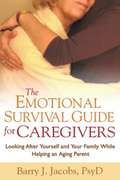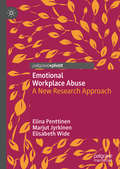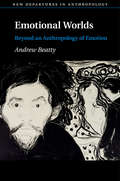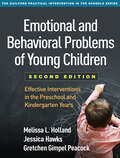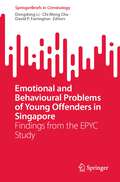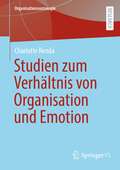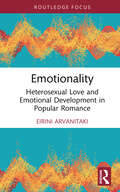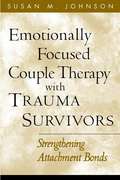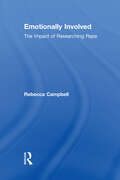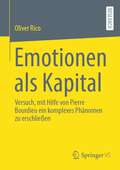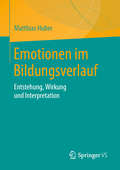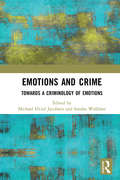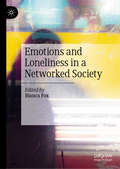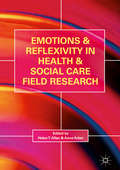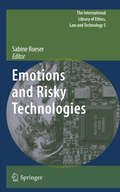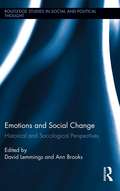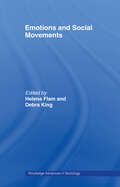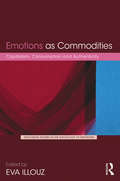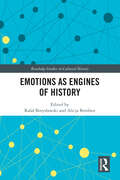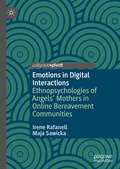- Table View
- List View
Emotional Survival Guide for Caregivers
by Barry Jacobs Steven ZaritCaring for a parent whose health is in decline turns the world upside down. The emotional fallout can be devastating, but it doesn't have to be that way. Empathic guidance from an expert who's been there can help. Through an account of two sisters and their ailing mother--interwoven with no-nonsense advice--The Emotional Survival Guide for Caregivers helps family members navigate tough decisions and make the most of their time together as they care for an aging parent. The author urges readers to be honest about the level of commitment they're able to make and emphasizes the need for clear communication within the family. While acknowledging their guilt, stress, and fatigue, he helps caregivers reaffirm emotional connections worn thin by the routine of daily care. This compassionate book will help families everywhere avoid burnout and preserve bonds during one of life's most difficult passages.
Emotional Workplace Abuse: A New Research Approach
by Elina Penttinen Marjut Jyrkinen Elisabeth WideAddressing emotional workplace abuse, this Palgrave Pivot takes a multidisciplinary approach which combines feminist research on violence with organisation and management studies, in order to offer a new approach on workplace violations. The book analyses why it is difficult for targets and organisations alike to name and identify emotional abuse and addresses the severe negative effects of abuse on the targets’ lives. It brings ethical leadership to the fore as a means to foster sustainable organisations. Using empirical data and research, this book highlights subtle forms of violations that take place in the workplace, and provides analysis from the perspective of the target. A valuable read for scholars and practitioners involved in organisational management and HRM, Emotional Workplace Abuse will help readers to understand the importance of sustainable leadership in preventing emotional workplace abuse.
Emotional Worlds: Beyond an Anthropology of Emotion (New Departures in Anthropology)
by Andrew BeattyAre emotions human universals? Is the concept of emotion an invention of Western tradition? If people in other cultures live radically different emotional lives how can we ever understand them? Using vivid, often dramatic, examples from around the world, and in dialogue with current work in psychology and philosophy, Andrew Beatty develops an anthropological perspective on the affective life, showing how emotions colour experience and transform situations; how, in turn, they are shaped by culture and history. In stark contrast with accounts that depend on lab simulations, interviews, and documentary reconstruction, he takes the reader into unfamiliar cultural worlds through a 'narrative' approach to emotions in naturalistic settings, showing how emotions tell a story and belong to larger stories. Combining richly detailed reporting with a careful critique of alternative approaches, he argues for an intimate grasp of local realities that restores the heartbeat to ethnography.
Emotional and Behavioral Problems of Young Children, Second Edition: Effective Interventions in the Preschool and Kindergarten Years
by Gretchen Gimpel Peacock Jessica Malmberg Melissa L. HollandPresenting interventions that are practical, effective, and easy to implement in educational and clinical settings, this book addresses the most frequently encountered emotional and behavioral problems in 3- to 6-year-olds. Strategies for collaborating with parents are emphasized. Practitioners are taken step by step through assessing and treating conduct problems, anxiety and other internalizing problems, toileting difficulties, picky eating and related concerns, and sleep problems. User-friendly features include 36 reproducible parent handouts, assessment forms, and other clinical tools; the print book has a large-size format with lay-flat binding for easy photocopying. Purchasers get access to a Web page where they can download and print the reproducible materials. This book is in The Guilford Practical Intervention in the Schools Series. New to This Edition *Reflects over a decade of research advances, plus new assessments and interventions. *Updated for DSM-5. *Chapter on intervention within a multi-tiered system of support (MTSS). *Chapter on referral procedures for complex problems. *Mindfulness techniques for both parents and children. *Cutting-edge ways to use acceptance and commitment therapy principles and motivational interviewing with parents. *23 new or revised reproducible tools.
Emotional and Behavioural Problems of Young Offenders in Singapore: Findings from the EPYC Study (SpringerBriefs in Criminology)
by David P. Farrington Dongdong Li Chi Meng ChuThis book presents the findings from the Enhancing Positive Outcomes in Youth and the Community (EPYC) study. EPYC is a ground-breaking nationwide 10-year longitudinal study on young offenders in Singapore. It focuses on understanding crime prevention, rehabilitation, and reintegration of these youths. Data were collected through yearly interviews, external assessments, and linkage of administrative records to provide a comprehensive picture of participants. In addition, a non-offender youth sample was included as a normative comparison sample. The research and findings of this book focus on:Prevalence rates and comorbidity of Emotional and Behavioural Problems (EBPs) in young offendersDrug use and Re-offendingRisk and Protective Factors for EBPs As this study represents one of the first in Asia and one of few across the globe with such in-depth investigations, it aims to advance the understanding of youth offending and associated emotional and behavioural issues. This book is best suited for criminal justice and mental health scholars, practitioners, and policy makers who are working with Asian populations or interested in cross-cultural comparisons.
Emotional and Ethical Challenges for Field Research in Africa
by Susan Thomson An Ansoms Jude MurisonAcademic literature rarely gives an account of the ethical challenges and emotional pitfalls the researcher is confronted with before, during and after being in the field. Giving personal accounts, the authors explore some of the challenges one can face when engaging in local-level research in difficult situations.
Emotionale Mitgliedschaft – Studien zum Verhältnis von Organisation, Emotion und Individuum (Organisationssoziologie)
by Charlotte RendaDas Buchvorhaben bringt zwei Themen zusammen, die unterschiedlich lange Traditionen innerhalb der Soziologie besitzen, aber beide von ungebrochener Aktualität sind: das Thema „Individuum und Organisation“ sowie das Thema „Emotionen am Arbeitsplatz“. In Zeiten, in denen Diskurse um Gefühlsarbeit und emotionales Selbstmanagement, aber auch der Selbstermächtigung und Anerkennung im Beruf an Gewicht gewinnen, gilt es, das Spannungsverhältnis zwischen Individuum und Kollektiv in seinen emotionalen Weiterungen neu zu beleuchten. Von einem organisationssoziologischen Ausgangspunkt her untersucht Charlotte Renda, wie an den schicksalhaften Überschneidungspunkten von dienstlichem Handeln und persönlicher Betroffenheit (sei es des Handelnden selbst, sei es dessen, der sich durch ihn behandelt sieht) eine organisationseigene emotionale Dynamik entsteht, ohne die Organisationsrationalitäten nicht zu denken sind. Das Buch versammelt unter dieser Fragestellung Studien zur Dynamik von Mitarbeiterauswahl und -evaluation, zu emotionalen Sozialtechniken im Kündigungsprozess und der Professionalisierung und Vermarktlichung dieser Techniken durch Auslagerung von Kündigungen an die sogenannte Outplacement-Beratungsindustrie, sowie zu Statuskarrieren und Identitätskonstruktion innerhalb der Organisation.
Emotionality: Heterosexual Love and Emotional Development in Popular Romance (Routledge Focus on Literature)
by Eirini ArvanitakiThis book focuses on the projections of romantic love and its progression in a selection of popular romance novels and identifies an innovation within the genre’s formula and structure. Taking into account Giddens’s notion of ‘confluent’ love, this book argues that two forms of love exist within these texts: romantic and confluent love. The analysis of these love variants suggests that a continuum emerges which signifies the complexity but also the formation and progressive nature of the protagonists’ love relationships. This continuum is divided into three stages: the pre-personal, semi-personal, and personal. The first phase connotes the introduction of the protagonists and describes the sexual attraction they experience for each other. The second phase refers to the initiation of the sexual interaction between the heroine and hero without any emotional involvement. The third and final phase begins when emotions such as jealousy, shame/guilt, anger, and self-sacrifice are awakened and acknowledged.
Emotionally Focused Couple Therapy with Trauma Survivors
by Susan M JohnsonThis book provides a theoretical framework and an innovative model of intervention for distressed couples whose relationships are affected by the echoes of trauma. Combining attachment theory, trauma research, and emotionally focused therapeutic techniques, Susan M. Johnson guides the clinician in modifying the interactional patterns that maintain traumatic stress and fostering positive, healing relationships among survivors and their partners. In-depth case material brings to life the process of assessment and treatment with couples coping with the impact of different kinds of trauma, including childhood abuse, serious illness, and combat experiences. The concluding chapter features valuable advice on therapist self-care.
Emotionally Involved: The Impact of Researching Rape
by Rebecca CampbellTackling difficult issues, Emotionally Involved gives a vivid picture the challenges researchers who studey traumatic events face. It is essential reading for researchers, therapists, fieldworkers, for those on the frontlines of rape crisis and domestic violence work, and for anyone concerned with the role of emotions in social science.
Emotionen als Kapital: Versuch, mit Hilfe von Pierre Bourdieu ein komplexes Phänomen zu erschließen
by Oliver RicoEmotionen, Gefühle und Affekte bezeichnen einen Bereich in der modernen Soziologie, der in einem gewissen Sinne als übersehen oder vielleicht gar als vergessen zu bezeichnen ist. Dies ist durchaus verwunderlich, insofern offensichtlich Emotionen eine große Rolle nicht nur in den alltäglichen Beziehungen der Menschen untereinander spielen, sondern auch in anderen, beispielsweise politischen. Wie viele andere moderne Soziologen kommt auch Bourdieu kaum auf diese Seite des Menschen zu sprechen und doch bietet seine Soziologie durchaus Anknüpfungspunkte, Emotionen und Gefühle zu analysieren und sie soziologisch zu interpretieren. Das Ziel der Arbeit besteht darin, Emotionen als Kapital im Sinne Bourdieus zu deuten und von diesem Gesichtspunkt aus spezifische Aspekte menschlicher Interaktionen besser zu verstehen. Der Nachweis, dass Emotionen tatsächlich als Kapital zu verstehen sind, erweist sich dadurch, dass Emotionen in alle Kapitalsorten konvertibel sind. Im Zuge dieses Nachweises stellt sich heraus, dass vor allem in politischen Kontexten Emotionen besonders leicht in die anderen Kapitalsorten tauschbar sind. Aber auch in der Finanzindustrie beispielsweise (bzw. der Ökonomie im Allgemeinen) spielen Emotionen, entgegen der Voraussetzungen der Wirtschaftswissenschaften, eine große Rolle.
Emotionen im Bildungsverlauf: Entstehung, Wirkung und Interpretation
by Matthias HuberDas Buch widmet sich in systematischer Weise der Bedeutung von Emotionen für Bildungsverläufe und Bildungslaufbahnentscheidungen. Im Anschluss an einen fundierten theoretischen Überblick historischer und aktueller Perspektiven auf Bildung und Emotion wird auf der Grundlage einer multimethodischen und partizipativen Studie der zentrale Stellenwert von Emotionen im Bildungsverlauf veranschaulicht. Dabei wird erstmals deutlich, welche emotional konnotierten Vorstellungsbilder Schülerinnen und Schüler in ihrer Bildungslaufbahn maßgeblich leiten und was die zentralen Einflussfaktoren für die Entstehung jener Vorstellungsbilder sind. Überdies wird gezeigt, welche Emotionen und emotionalen Qualitäten im Bildungskontext aus subjektiver Perspektive die Bedeutendsten sind und welche Funktionen und Wirkungen Emotionen in der eigenen Bildungsbiografie zeitigen.
Emotions Matter
by Alan Hunt Dale Spencer Kevin WalbyThe sociology of emotions has recently undergone a renaissance, raising new questions for the social sciences: How should we define and study emotions? How are emotions related to perennial sociological debates about structure, power, and agency? Emotions Matter brings together leading international scholars to build on and extend sociological understandings of emotions.Moving beyond reductionist approaches that frame emotions as idiosyncratic states of mind, the scholars in this collection conceptualize emotions as the experience of social relations. Empirical and theoretical chapters demonstrate how emotions relate to sociological theories of interaction, the body, gender, and communication. Pushing the boundaries of sociology and stimulating debate for related fields, Emotions Matter offers diverse relational approaches that illustrate the crucial importance of emotions to the sociological imagination.
Emotions and Crime: Towards a Criminology of Emotions
by Sandra Walklate Michael Hviid JacobsenIn spite of the fact that crime is an emotive topic, the question of emotion has been largely overlooked in criminological research, which has tended instead to examine criminal conduct in terms of structural background variables or rational decision-making. Building on research into emotions within sociology, this book seeks to show how criminologists can in fact take emotions seriously and why criminology needs to begin considering emotions as a central element of its theoretical, conceptual and methodological apparatus. Thematically organised and presenting both empirical and theoretical studies, Emotions and Crime pays attention to the different emotional dimensions of crime, victimhood, the criminal justice system, the practice of criminological research and the discipline of criminology. Bringing together the work of an international team of authors and discussing research into violence, punishment, gender, imprisonment and mass atrocity, this volume shows how crime and emotions are inextricably connected, and illustrates both the hidden and pervasive role of emotions in criminological work.
Emotions and Daily Life in Colonial Mexico (Diálogos Series)
by Javier Villa-Flores Sonya Lipsett-RiveraThe history of emotions is a new approach to social history, and this book is the first in English to systematically examine emotions in colonial Mexico. It is easy to assume that emotions are a given, unchanging aspect of human psychology. But the emotions we feel reflect the times in which we live. People express themselves within the norms and prescriptions particular to their society, their class, their ethnicity, and other factors. The essays collected here chart daily life through the study of sex and marriage, love, lust and jealousy, civic rituals and preaching, gambling and leisure, prayer and penance, and protest and rebellion. The first part of the book deals with how individuals experienced emotions on a personal level. The second group of essays explores the role of institutions in guiding and channeling the expression and the objects of emotions.
Emotions and Loneliness in a Networked Society
by Bianca FoxLoneliness affects quality of life, life satisfaction, and well-being, and it is associated with various health problems, both somatic and mental. This book takes an international and interdisciplinary approach to the study of loneliness, identifying and bridging the gaps in academic research on loneliness, and creating new research pathways. Focusing in particular on loneliness in the context of new and emergent communication technologies, it provides a wide range of theoretical and methodological perspectives and will contribute to the re-evaluation of the way we understand and research this contemporary global phenomenon.
Emotions and Reflexivity in Health & Social Care Field Research
by Helen T. Allan Anne ArberThis book is about emotions and reflexivity when doing field research in health and social care settings. Health and social care students often undertake field research in their own area of practice using observation and interviews. All contributing authors have a dual identity as researchers and health or social care professionals. Their chapters draw on research carried out in a number of fields including HIV related infertility and adoption, primary care in Africa, cancer and palliative care, infertility and excluded young people to explore issues relevant to emotions and reflexivity from the perspective of the researcher and research participants. The book was born of the two editors, who are experienced research supervisors, observing that many PhD students struggle to manage the emotions elicited in the field when researching. They identify three main causes - health and social care deals with painful topics; observation and interviews bring student into contact with powerful feelings which need processing; there is very little advice and discussion of how a PhD student manages emotions in the field and students therefore frequently struggle on their own. This insightful volume will be of great interest to scholars and students in all areas of academic study, but particularly to those who chose to study health and social care whether they are professionals or not.
Emotions and Risky Technologies
by Sabine RoeserBy offering an original and challenging approach to the topic of risk and emotion, this book covers new territory. It focuses on risk and emotion from the perspective of moral philosophy and emphasizes that emotions are an important source of moral knowledge.
Emotions and Social Change: Historical and Sociological Perspectives (Routledge Studies in Social and Political Thought #89)
by David Lemmings Ann BrooksThis edited collection takes a critical perspective on Norbert Elias’s theory of the "civilizing process," through historical essays and contemporary analysis from sociologists and cultural theorists. It focuses on changes in emotional regimes or styles and considers the intersection of emotions and social change, historically and contemporaneously. The book is set in the context of increasing interest among humanities and social science scholars in reconsidering the significance of emotion and affect in society, and the development of empirical research and theorizing around these subjects. Some have labeled this interest as an "affective turn" or a "turn to affect," which suggests a profound and wide-ranging reshaping of disciplines. Building upon complex theoretical models of emotions and social change, the chapters exemplify this shift in analysis of emotions and affect, and suggest different approaches to investigation which may help to shape the direction of sociological and historical thinking and research.
Emotions and Social Movements (Routledge Advances in Sociology #Vol. 14)
by Helena Flam Debra KingMost research on social movements has ignored the significance of emotions. This edited volume seeks to redress this oversight and introduces new research themes and tools to the field of emotions and social movements. Sociologists and political activists around the world will find this volume to be of great interest due to its wide-ranging approach and its unique emphasis on the role of emotion in protest, dissent and social movements.
Emotions and the Making of Psychiatric Reform in Britain, c. 1770-1820 (Palgrave Studies in the History of Emotions)
by Mark NeuendorfThis book explores the ways which people navigated the emotions provoked by the mad in Britain across the long eighteenth century. Building upon recent advances in the historical study of emotions, it plots the evolution of attitudes towards insanity, and considers how shifting emotional norms influenced the development of a ‘humanitarian’ temperament, which drove the earliest movements for psychiatric reform in England and Scotland. Reacting to a ‘culture of sensibility’, which encouraged tears at the sight of tender suffering, early asylum reformers chose instead to express their humanity through unflinching resolve, charging into madhouses to contemplate scenes of misery usually hidden from public view, and confronting the authorities that enabled neglect to flourish. This intervention required careful emotional management, which is documented comprehensively here for the first time. Drawing upon a wide array of medical and literary sources, this book provides invaluable insights into pre-modern attitudes towards insanity.
Emotions as Commodities: Capitalism, Consumption and Authenticity (Routledge Studies in the Sociology of Emotions)
by Eva IllouzCapitalism has made rationality into a pervasive feature of human action and yet, far from heralding a loss of emotionality, capitalist culture has been accompanied with an unprecedented intensification of emotional life. This raises the question: how could we have become increasingly rationalized and more intensely emotional? Emotions as Commodities offers a simple hypothesis: that consumer acts and emotional life have become closely and inseparably intertwined with each other, each one defining and enabling the other. Commodities facilitate the experience of emotions, and so emotions are converted into commodities. The contributors of this volume present the co-production of emotions and commodities as a new type of commodity that has gone unseen and unanalyzed by theories of consumption – emodity. Indeed, this innovative book explores how emodity includes atmospherical or mood-producing commodities, relation-marking commodities and mental commodities, all of which the purpose it is to change and improve the self. Analysing a variety of modern day situations such as emotional management through music, creation of urban sexual atmospheres and emotional transformation through psychotherapy, Emotions as Commodities will appeal to scholars, postgraduate students and postdoctoral researchers interested in fields such as Sociology, Cultural Studies, Marketing, Anthropology and Consumer Studies.
Emotions as Engines of History (Routledge Studies in Cultural History #113)
by Alicja Bemben Rafał BorysławskiSeeking to bridge the gap between various approaches to the study of emotions, this volume aims at a multidisciplinary examination of connections between emotions and history and the ways in which these connections have manifested themselves in historiography, cultural, and literary studies. The book offers a selected range of insights into the idea of emotions, affects, and emotionality as driving forces and agents of change in history. The fifteen essays it comprises probe into the emotional motives and dispositions behind both historical phenomena and the ways they were narrated.
Emotions as Engines of History (Routledge Studies in Cultural History)
by Alicja Bemben Rafał BorysławskiSeeking to bridge the gap between various approaches to the study of emotions, this volume aims at a multidisciplinary examination of connections between emotions and history and the ways in which these connections have manifested themselves in historiography, cultural, and literary studies. The book offers a selected range of insights into the idea of emotions, affects, and emotionality as driving forces and agents of change in history. The fifteen essays it comprises probe into the emotional motives and dispositions behind both historical phenomena and the ways they were narrated.
Emotions in Digital Interactions: Ethnopsychologies of Angels' Mothers in Online Bereavement Communities
by Irene Rafanell Maja SawickaCombining the conceptual tools of interactionist and social constructionist positions, this book presents an in-depth investigation of emotions in digital interactions. Through the central case study of online bereavement communities for women who have suffered perinatal loss, this volume highlights the significance of affective sanctioning as constitutive of group dynamics and practice. The authors chart the emergence of a new ethnopsychology of motherhood—the category of ‘Angels’ Mothers’—arising from the localized practices of a community whose experience of grief is otherwise disenfranchised. Through their detailed theoretical exploration of the centrality of micro-situational dynamics, alongside the rich empirical illustration of collectively shared feeling rules and norms, Rafanell and Sawicka develop a naturalistic approach to the analysis of empirical data, providing insights for policy-making interventions.
